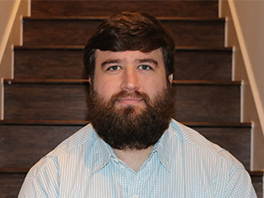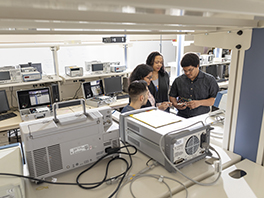The Core of Career Success
Engineering Alumnus Discovers His Passion, Career Path at UT Tyler
 Justin Hohnerlein of Kemah, Texas, graduated in 2013 with a bachelor’s degree in electrical
engineering and works at Advanced Micro Devices, a multinational company based in
California’s Silicon Valley. Learn more about the alumnus, how he found career success
through UT Tyler and what he enjoyed about the college.
Justin Hohnerlein of Kemah, Texas, graduated in 2013 with a bachelor’s degree in electrical
engineering and works at Advanced Micro Devices, a multinational company based in
California’s Silicon Valley. Learn more about the alumnus, how he found career success
through UT Tyler and what he enjoyed about the college.
Can you please tell us about yourself?
My name is Justin Hohnerlein. My stepfather joined the Army when I was young, and I lived in Europe for a few years and a few states in the U.S. before moving back to Kemah and finishing high school. From around the time I was in high school, I knew I wanted to do something with computers, but I didn’t find a real passion or specific point of interest until I was probably in my third or fourth year at UT Tyler.
I am a member of technical staff silicon design and verification engineer at Advanced Micro Devices (AMD). I work for the cores verification team, which worked on the last few generations of AMD Ryzen CPUs on the market and the cores for the chips in the new generation Xbox and PlayStation. More specifically, I am an infrastructure engineer within this team, and I work with our testing and simulation infrastructure, reporting and metrics methodology and flows, and our machine learning enhanced verification methodology.
Where do you see the industry going in the next five to 10 years?
I think the next shift in hardware design is around automation and machine learning. A fairly common generic saying is that hardware design is 20% design and 80% verification. When you spend such a large amount of your time in a project doing verification, there’s lots of possibility when it comes to time reduction, and lately those improvements are coming in the form of machine learning to create more efficient methods of verifying designs. Whether it’s smarter testing, better metrics or more efficient testbenches, a lot of the advancements we are seeing are related to using machine learning to augment our ability to verify the design.
How did UT Tyler prepare you for career success?
When you have small class sizes and that closer to one-on-one interaction, not just with the professors but also with your fellow students, I think it brings you closer to what your career with a good team would likely be. Being able to understand and work with your professor and fellow classmates helps you understand how to work within a team and be flexible in a team dynamic. School, by nature, is an individual effort, but having people around you who help you push and get into the breadth of the content you’re studying helps take you to the next level of the material. Understanding what your strengths are and understanding how to work within a group of people with a similar passion, translates really well to working on a team in your career.
What do you like best about the College of Engineering? The university?
I think one of the things that attracted me most to the university was that it is a smaller university in terms of class size. Having a much more intimate and personal conversation with your professors can lead to conversations at a depth that you just couldn’t have in a larger classroom setting. This also gives you a chance dig into topics you may not have even known about.
 What advice do you have for UT Tyler students?
What advice do you have for UT Tyler students?
One of the best pieces of advice I think I have gotten through college and my career is that your education doesn’t end when you get your degree. The people who achieve the most in their careers are the ones who never stop pushing the boundary of what’s possible. Continuing to learn and apply what you learn into your job and life will continue to expand your potential.
Make sure that, with all the midterms, projects, finals, graduation, job applications, work deadlines, etc., you take time for yourself. There will always be another semester, there will always be another day, there will always be another job. Don’t sacrifice your short-term mental health for a long-term goal that might not come if you don’t take care of yourself.
What are your hobbies/interests?
I have small children, so a lot of my time outside of work is focused on spending time with my family. As a break away from work, I enjoy music, and I also play guitar and video games.
#COE
Read more from the latest issue!




